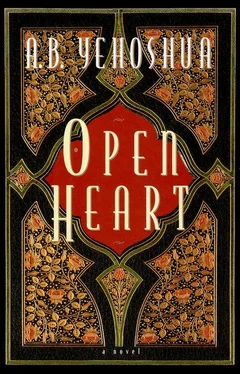A. Yehoshua - Open Heart
Здесь есть возможность читать онлайн «A. Yehoshua - Open Heart» весь текст электронной книги совершенно бесплатно (целиком полную версию без сокращений). В некоторых случаях можно слушать аудио, скачать через торрент в формате fb2 и присутствует краткое содержание. Год выпуска: 2014, Издательство: Peter Halban, Жанр: Современная проза, на английском языке. Описание произведения, (предисловие) а так же отзывы посетителей доступны на портале библиотеки ЛибКат.
- Название:Open Heart
- Автор:
- Издательство:Peter Halban
- Жанр:
- Год:2014
- ISBN:нет данных
- Рейтинг книги:3 / 5. Голосов: 1
-
Избранное:Добавить в избранное
- Отзывы:
-
Ваша оценка:
- 60
- 1
- 2
- 3
- 4
- 5
Open Heart: краткое содержание, описание и аннотация
Предлагаем к чтению аннотацию, описание, краткое содержание или предисловие (зависит от того, что написал сам автор книги «Open Heart»). Если вы не нашли необходимую информацию о книге — напишите в комментариях, мы постараемся отыскать её.
Open Heart — читать онлайн бесплатно полную книгу (весь текст) целиком
Ниже представлен текст книги, разбитый по страницам. Система сохранения места последней прочитанной страницы, позволяет с удобством читать онлайн бесплатно книгу «Open Heart», без необходимости каждый раз заново искать на чём Вы остановились. Поставьте закладку, и сможете в любой момент перейти на страницу, на которой закончили чтение.
Интервал:
Закладка:
“An anesthetist?” asked my father, without disguising his disappointment. “Only an anesthetist? And why only a half-time job?” he continued in the demanding tone he had adopted vis-à-vis Lazar ever since the trip to India. “Because for now that’s all that’s available,” I replied with a smile. “Dr. Nakash is retiring next year, but I’m not getting his job.”
“Dr. Nakash is already retiring?” my parents, who remembered him favorably from the wedding, exclaimed in surprise. I too had been surprised when I heard about his retirement. The darkness of his skin and the smooth freshness of his face had misled us about his real age. “But why did you have to bring Lazar and his wife to our room? I don’t understand.” My mother returned doggedly to the original subject of our conversation. I lowered my head slightly so she would not be able to look into my eyes and said, “Not both of them, only his wife. Lazar was busy checking out some equipment Sir Geoffrey wanted to offer our hospital, and in the meantime, so that she wouldn’t be bored, I took his wife to see Shivi in the nursery, and then I showed her around the hospital, and after that I took her for a little walk, and I thought I might as well show her this great room that Michaela found for you. Maybe they’ll want to rent it themselves one day.” At this my mother pointed out that I had been wasting my time — the house was being sold in the summer, and the new owners would doubtless want to use all the rooms themselves. “So then I misled her,” I said, trying on the green cardigan my father had brought me — for the first time in his life on his own initiative — as a souvenir from the Isle of Skye. My mother was silent. Although she was not satisfied by my explanation for Mrs. Lazar’s visit to their room, what other explanation could she possibly imagine? She was not a worldly woman, and there was certainly nothing in her experience that might prompt her to guess the impossible truth. She gave up and sat there, sad and exhausted, coughing from time to time. I didn’t like the sound of her cough, but since I had never dared to auscultate her heart or lungs with a stethoscope, I could only hope that the cough syrups my physician cousin had given her would help.
But they didn’t, and for the last week of my parents’ stay in London she refrained from taking the baby into her arms, which I could see was a real sacrifice for her, since Shivi had obviously captured her heart, and not only because she was her granddaughter. Michaela, who could see my mother’s sadness, tried to set her fears at rest. “Take her,” she said persuasively. “You won’t infect her with anything, don’t worry. She’s as healthy as an ox.” But in spite of my mother’s longing to rock the sweet little “ox” in her arms, she was careful not to come too close to her and only gave her sometimes to my father, who looked at the baby in his arms with an expression of playful reproof. We were all sorry for my mother, whose visit to England was ending so sadly. To make up for it to her, a few days before they were due to leave Michaela insisted on inviting them to an Indian night. Stephanie volunteered to baby-sit, and I was instructed to take a day off, for our night began at twilight with a lavish meal at an excellent and far from cheap Indian restaurant, after which we were to attend a performance by traveling troupes of singers, musicians, dancers, storytellers, and acrobats who had been gathered from all over India and brought to Europe by the Parisian Cirque du Soleil, which had taken upon itself the mission of fostering the art of the Third World, in the belief that it was important and worthy of support. This belief was shared by Michaela, who was very excited about the event, not only because of the enjoyment she expected to have herself but also because she was very curious to see how the rest of us would react. Since she had presented herself from the beginning as a missionary for India in the non-Indian world, she felt responsible for the evening’s entertainment, which was quite expensive, since the tickets were priced as if it were a charity performance. But as far as the money was concerned, at least, nobody could object, since the whole evening was being paid for by Michaela.
I joined in the general spirit of generosity and treated everyone to drinks before the meal and a bottle of wine to accompany it, which turned out to be a very good thing, for the slightly inebriated state in which we all reached the performance helped us gain a deeper appreciation of things that at first glance, and in spite of our goodwill toward Michaela, seemed completely primitive. Take the opening “act”: a half-naked fakir, his head covered with a mane of gleaming black hair which reached down to his chest, emerged from the audience, walked with slow, grave, thoughtful steps through the vast warehouse in the old port of London which had been converted into a hall for the performance, and climbed onto the huge, empty stage, which began to be suffused with the delicate shades of light of an Indian morning, just as I remembered them. He turned a little faucet, and in a profound silence began deliberately and at length to wash his hands, feet, and face. As he began to perform yoga exercises, facing the invisible sun, little troupes of performers entered one after the other, each dressed in a different color and carrying authentic folk instruments. Each group was composed of adults and children of various ages, who were referred to modestly in the program as “pupils,” and who, despite the astonishing talents that a number of them displayed, were anxiously attentive throughout the evening to the subtle signals of their adult instructors. Although each troupe was allotted its own performance time and they were grouped separately in the corners of the vast stage, which was supposed to symbolize the map of India, they kept up a special kind of dialogue throughout the evening. While singers from one troupe performed, a child acrobat from another troupe would spring without warning from his place and for two or three minutes turn daring somersaults and cartwheels until he suddenly froze into a many-limbed contortion, like the statuette next to Michaela’s bed or like some primeval animal that no longer exists in the world; then he would unravel himself and go quietly back to his place. Or in the middle of a dance by three little girls, the ancient magician would suddenly rise from the heights of his podium at the back of the stage, throw some new magic into the air, and sink back to his seat. It was evident that a Western hand had intervened in the direction of the performance, in the attempt to create a meaningful tension between all the elements, whose power and uniqueness did not easily lend themselves to collaboration.
The primitiveness of these troupes was evident in the simple movements of the dancers and in the musical instruments, which consisted, for example, of two plain boards of wood banged together astonishingly fast, or chains of little bells tied around the ankles and tinkling with the movements of the feet, or even of a broken clay jar whose spout could be sucked to produce a sound resembling the rumble of approaching thunder. It was precisely this primitiveness that aroused a storm of emotion in Michaela. She had expected something more stylish, adapted to the “limitations” of the Western mentality, and here she was suddenly confronted, in the middle of gray London, with absolute authenticity, of the kind she remembered so vividly from the dark alleys of Calcutta or the train station of Bombay. Her cheeks burned, and tears shone in her great eyes, as if she had discovered something precious and intimate that had been lost to her and that she no longer believed she would find again, although in her heart of hearts she had not given up hoping. I noticed that in her excitement she kept losing her concentration, and her eyes would stray from the stage to us, as if to test our reactions and see if in us too the right soul was coming to life. And I think that we passed the test; not only I, to whom the Indian dancers and singers seemed to be reenacting the gradual and imperceptible process by which I had fallen in love the previous winter, but even my father — who my mother and I suspected would not have the patience for a performance without a plot — appeared tense and moved by the silent but clear and touching dialogue taking place between the “pupils” and the “teachers,” which began with acrobatic exercises agilely performed by a hefty Indian countrywoman and emulated by a little girl and boy, who were not daunted by the most amazing and dangerous tricks, and ended with a tall, gorgeous Indian woman wrapped in a glittering sari, who told with growing vehemence a long, impassioned story, which according to the program notes concerned the struggles between the gods. When the performance came to an end, the children in the audience were invited to join the Indian artists dancing and singing on the stage, and the stage was suddenly filled with rosy-cheeked, blond English children, who began to imitate the Indians’ movements with such astonishing skill that it seemed as if they must be possessed by wandering Indian souls.
Читать дальшеИнтервал:
Закладка:
Похожие книги на «Open Heart»
Представляем Вашему вниманию похожие книги на «Open Heart» списком для выбора. Мы отобрали схожую по названию и смыслу литературу в надежде предоставить читателям больше вариантов отыскать новые, интересные, ещё непрочитанные произведения.
Обсуждение, отзывы о книге «Open Heart» и просто собственные мнения читателей. Оставьте ваши комментарии, напишите, что Вы думаете о произведении, его смысле или главных героях. Укажите что конкретно понравилось, а что нет, и почему Вы так считаете.












